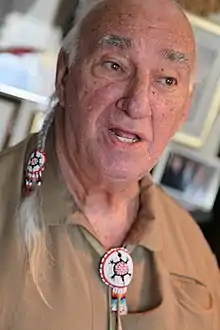Max Gros-Louis
Magella Gros-Louis OC OQ (6 August 1931 – 14 November 2020), known as Max Gros-Louis or Oné Onti, was a Canadian politician and businessman in Quebec. For many years, he was Grand Chief of the Huron-Wendat First Nation. He founded and directed various important organizations, which are dedicated to the culture and rights of the First Nations People in Canada.
Max Gros-Louis | |
|---|---|
| Oné Onti | |
 Max Gros-Louis in 2011 | |
| Grand Chief of the Huron-Wendat First Nation | |
| In office 1964–1984 | |
| In office 1994–1996 | |
| In office 2004–2008 | |
| Personal details | |
| Born | Magella Gros-Louis August 6, 1931 Wendake, Quebec |
| Died | November 14, 2020 (aged 89) Quebec City, Quebec |
Early life
Gros-Louis was born on 6 August 1931, in Wendake, Quebec, which was then known as Huron Village Indian Reservation.[1][2] He was the son of Cecile Talbot and Gerard Gros-Louis.[3] Gerard Gros-Louis served for 16 years as vice-chief of the Huron-Wendat First Nation and the family had resided in Huron since Max Gros-Louis' great-grandfather Nicolas moved there with the Huron from L'Ancienne-Lorette, Quebec.[4] Gros-Louis attended school in Loretteville, but left at age 16.[3] As a youth Gros-Louis received the Wendat name Oné Onti, meaning "paddler".[1]
Gros-Louis initially made a living by hunting, fishing and trapping on the Huron-Wendat First Nation's traditional lands. He later worked as a guide, leading people on similar expeditions.[1] He also worked as a surveyor and as a travelling salesman. He later opened a small shop "Le Huron" where he sold snowshoes, moccasins and other First Nation crafts, and also managed a dance company.[5] In the course of his business he travelled widely to other indigenous communities and this led to his involvement in politics.[1]
Political career
In 1964 he was elected Grand Chief of the Huron-Wendat Nation in Wendake.[6] At this time the reservation measured just 16 hectares (40 acres; 0.062 sq mi) and Gros-Louis negotiated an increase in size to 164 hectares (410 acres). He also negotiated the boundary of the nation's ancestral land with that of the Innu.[4] Between 1965 and 1976 he was successively a founding member, vice president and secretary-treasurer of the Association des Indiens du Québec.[6][7] Gros-Louis was involved in creating the "Indians of Canada" pavilion at the Expo 67 world's fair in Montreal.[2] In 1970 he became the Quebec representative to the National Indian Brotherhood.[2]
Gros-Louis has written an autobiography titled First Among the Huron, published in 1973.[2] In 1983 Gros-Louis represented First Nations Quebecers at federal constitutional conferences on aboriginal law. As Chief, he instituted a program to found businesses and create employment in his community.[8] His first period as chief ended in 1984 but three years later he returned to the role, remaining until 1996.[1] Gros-Louis was Director and Vice Chief of the Assembly of First Nations for ten years.[9]
Gros-Louis was once more elected Grand Chief of the Huron-Wendat Nation in 2004, and remained in that position until 2008, when he was defeated by Konrad Sioui.[10] During his time as chief he worked to increase the size of the nation's territory, improve its international standing and to highlight maltreatment of indigenous people.[11] During his political career he served as national vice-chief of the Assembly of First Nations, vice-chief of the North American Assembly of First Nations and vice-chief of the World Assembly of First Nations.[4]
Later life
In 2010 Gros-Louis was involved in a controversy when he accepted a donation for a museum which did not yet exist.[12] In 2012, a book about the life of Gros-Louis, written by Alain Bouchard, Max Gros-Louis Le corbeau de Wendake, was published.[13]
Gros-Louis was awarded as an officer of the National Order of Quebec and in December 2015, he was awarded the Order of Canada with the grade of officer.[14] He also received honours from the Belgian l’Académie Diplomatique de la Paix and from France received the Legion of Honour and the National Order of Merit.[4]
Gros-Louis died on 14 November 2020, in Hôtel-Dieu de Québec, at the age of 89.[15][16]
References
- "Max Gros-Louis, former grand chief of Huron-Wendat First Nation, dies at 89". CBC. November 14, 2020. Retrieved November 15, 2020.
- "Max Gros-Louis". The Canadian Encyclopedia.
- Rencontre. Vol. 15–16. Secrétariat des activités gouvernementales en milieu amérindien et inuit. 1993. pp. 172–173.
- Cabana, Julien (November 3, 2020). "Max Gros-Louis, un homme plus grand que nature". Le Journal de Québec. Retrieved November 15, 2020.
- Jane Campbell (January 1, 2006). The Retrospective Review (1820-1828) and the Revival of Seventeenth Century Poetry. Wilfrid Laurier Univ. Press. pp. 61–. ISBN 978-0-88920-866-7.
- "Un duel entre Sioui et Gros-Louis à Wendake". Le Journal de Québec, Jean-François Racine, September 18, 2016
- Caroline Desbiens (May 15, 2013). Power from the North: Territory, Identity, and the Culture of Hydroelectricity in Quebec. UBC Press. pp. 232–. ISBN 978-0-7748-2418-7.
- Canadian Anthropology Society (1992). The Rise of Native Self-Determination and the Crisis of the Canadian Political Regime. pp. 70–.
{{cite book}}:|work=ignored (help) - http://edimage.ca/edimage/grandspersonnages/en/carte_m01.html
- "Sioui défait Gros-Louis". Radio Canada, November 1, 2008
- "Max Gros-Louis, former leader of Huron Wendat First Nation, dies at 89". Global News. November 14, 2020. Retrieved November 15, 2020.
- "Max Gros-Louis sème la controverse". Jean-Luc Lavallée, Actualities, Canoe.ca, March 16, 2010
- "À la découverte du vrai Max Gros-Louis". L'Actuel, Isabelle Chabot, September 24, 2012
- "Order of Canada Appointments". The Governor General of Canada His Excellency the Right Honourable David Johnston. Governor General of Canada. Retrieved December 31, 2015.
- "Max Gros-Louis n'est plus". TVA Nouvelles (in French). Retrieved November 15, 2020.
- "Wendake | L'ancien grand chef Max Gros-Louis n'est plus". La Presse. November 14, 2020.
Freeman, Alan (November 21, 2020). "Huron-Wendat Grand Chief was a strong and charismatic advocate for his people". The Globe and Mail. Retrieved October 16, 2021.